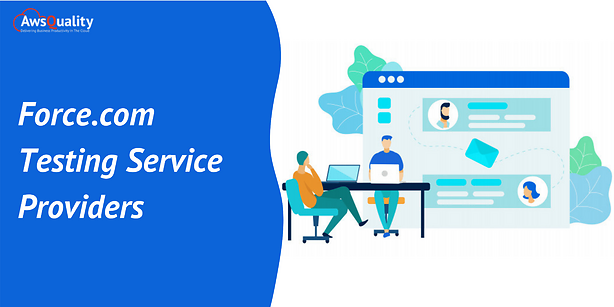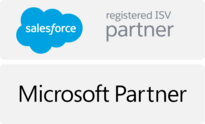
Validating workflows, user experience, business requirements, APIs, and security models.
The best thing about the world's most popular CRM Salesforce is its adaptability and agile development. Most of the features that Salesforce offers can be customized to fit the requirements of any business. But how to make sure that customizations are going to live up to the expectations? The Solution is Force.com testing services.
Force.com testing is the process of validating the customizations and configurations performed in SDFC.
AwsQuality provides project-based, on-Demand, and dedicated support for Force.com testing Services.
Why ForceCom testing?
Not sure about the whole testing idea? Here we have drafted the top reasons to go for ForceCom testing:
- Catch bugs early when they're easy to tackle
- Verify if the code and configuration are working properly.
- Create a functioning flow report based on the result of test instances.
- Testing allows you to confirm that the final product can support your business module.
- Monitor the performance status and behavior of the application with process building features.
- It helps you to make sure that the instance's primary build matches the actual requirements.
- Workflows enable you to control the execution of time-based functions.
Our Force.com Testing Expertise
Force.com testing is our forte, we are specialized in the following Salesforce testing domains:
- ForceCom Functional Testing
- Workflow Testing
- Integration Testing
- Security Testing
- ForceCom Performance Testing
- Usability Testing
- Volume Testing
- Configuration Testing
- Unit Testing (by Developers)
- Frontend and Backend Testing
- Acceptance Testing (Alpha and Beta)
- Customization Testing
- Lightning Testing
- Production and Release Testing
- Sandbox Testing
- UAT Support
- Regression Testing
- Testing Automation
AwsQuality’s Force.com Testing Methodologies
We follow a thorough testing process to identify every bug that can cause you any trouble in the future. It’s our job to provide our clients with clean, bug-free, and high-performing force.com applications and CRM solutions. Have a look at our detailed testing process:
-
Unit Testing:
The unit testing procedure is managed by Apex developers. It includes writing phrases in the code that automatically inquire the instance.
Unit testing allows the testing team to calculate how many records of data are affected it helps the code to operate successfully in the environment.</h4 -
System Testing:
System testing includes examining the technical processes of the system inside-out and testing scripts on the basis of specific outputs.
It aids the testing team to troubleshoot a bug with the help of automated commands in the system as validation, assignment, and workflow. -
UAT Testing:
AwsQuality assists the end-user of the application to conduct UAT testing. This way we try to make sure that the system is capable enough to sustain the business structure of our client.
UAT testing observes a test script based on the business process of the client's enterprise. At the end of the day, it's the requirement of your business that matters the most. -
Production Testing:
Production Testing is identical to system testing, but it is performed in the Production environment. Production Testing is applied to verify if the code and the configurations have been deployed accurately in the production environment from the sandbox.
The testing teams must always go through UAT scripts again after the deployment. -
Regression Testing:
Regression testing is conducted when some modifications or fixes have been done in the system. The primary aim of Regression testing is to examine if the code and configuration releases are influencing the existing operations of the system.
Reduce your Force.com testing cycle by 40% by leveraging AwsQuality's test automation Services. Contact us now!
Consult Now
FAQ's
Salesforce testing necessitates complex test methodologies because most of Salesforce's features are built-in and customizable. When an issue is discovered, the tester must ensure that he tests the customized code rather than the built-in salesforce functionality.
Salesforce testing verifies the configuration and customization done in vanilla SDFC. The challenge is to ensure that a tester checks customized code rather than testing built-in salesforce functionality.
Salesforce UAT is the process of confirming or denying that a desired version of the CRM meets the business requirements before deploying Salesforce.
Salesforce QA teams verify the application against the applicable standards and needs. This type of Salesforce test examines each software function by providing appropriate input and comparing the output to the functional requirements.
• HubSpot CRM
• BIGContacts
• Salesflare
• Zoho CRM
• Pipedrive
• Less Annoying CRM
• Salesforce Sales Cloud Lightning Professional
• Apptivo CRM
• Apache JMeter
• Web LOAD
• Load UI Pro
• Load View
• Neo Load
• LoadRunner
• Silk Performer
The CRM domain is a compact alpha/beta domain consisting of a four-stranded beta-sheet and three alpha-helices with an alpha-beta-alpha-beta-alpha-beta-beta topology.
Salesforce testing is divided into two categories:
• Salesforce Functional Testing
• Salesforce UAT Testing
Salesforce offers several tools to help you automate your organization's repetitive business processes, including Approvals, Process Builder, Workflow, and Flow Builder.



